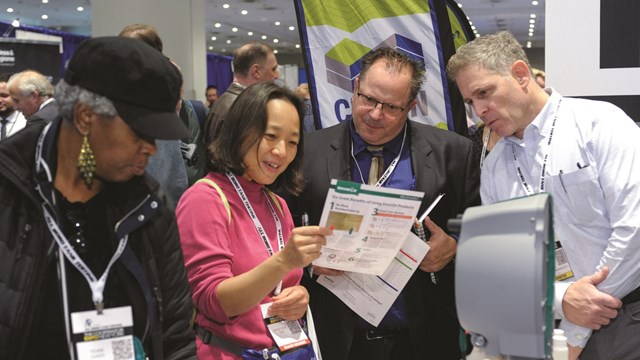Community associations are microcosms of democracy, run by an elected board of volunteers trusted to make good decisions on behalf of the community as a whole. Boards make the call on every large and small issue for their constituency. So it's not only imperative that these members are carefully vetted and selected, but that during transitions of power from one board to the next, members with more experience help ease in the newcomers to shorten the learning curve and smooth the transition.
Board transitions usually happen after elections at the annual association meeting (often in smaller communities, the same people will be elected or appointed to the board year after year, which in the absence of formal term limits is not necessarily a bad thing). But they can also take place when a board of owners or shareholders in a new development takes the reins from the sponsor or landlord. There are nuances unique to these individual scenarios, but all involve new members acclimating to their roles and relying on the expertise of those who preceded them.
Continuity Is Key
It's pretty rare to see the constitution of a community association board change completely from one election to the next. Unless there's major upheaval – usually as a result of some type of scandal – at least a few board members will be holdovers from the previous administration.
“A staggered board tends to work best,” says Claudine Gruen, Vice President at Garthchester Realty, which has offices in Forest Hills and Scarsdale, New York. “In many buildings, the same board remains year after year, as the members all seek re-election. In my opinion, you want at least a majority of board members to return so that they can catch up new shareholders, as well as any first-time members. Those new members can also review monthly reports and minutes from the previous year in order to better understand what the prior board had done. As management we also provide a tidy synopsis covering what's currently underway, what projects we're involved in, etc.”
While term limits for board members are not universal by any means, they are becoming increasingly common within the governing documents of associations, according to Philip Renzi, Principal with property management firm Renzi Bulger Group in Arlington, Massachusetts. He also recommends staggered terms: “This allows some continuity on the board each year, and allows the board to keep momentum on projects or initiatives. If there are not staggered terms in place, the board should speak to its lawyer about the amendment process and alter their documents to include them.”
Of course, management companies exist to help guide the board around any bumps in the road. “Ultimately the manager should have a list of action items and progress reports on what the previous board was discussing, voting on, or had already approved,” says Renzi. “The manager should also ensure that the incoming board and management are on the same page, so the manager can be productive and not focus on tasks in which the incoming board has no interest. Management is also encouraged to bring up any previously presented recommendations or goals where no action was taken, to make sure that the new board is up-do-date on any matters that the management company believes to be important.”
Square One
When a building is being converted to a condo or co-op, or has been newly constructed explicitly as a condo or co-op property, operations are initially under the control of the owner or developer, and are eventually passed along to a board of owners or shareholders after a certain percentage of units have been sold. According to attorney David Berkey of New York City law firm Gallet Dreyer & Berkey: “Once a sponsor no longer has majority ownership of a building, it is obliged to give up majority control of the board. Usually they will wait until the next annual meeting.
“When a shareholder- or ownership-majority board is in place, it must first deal with several immediate practical issues,” Berkey continues. “The first is whether to retain management. In most buildings, the sponsor will have a relationship with a management company, so it's often a good idea for the association board to get an independent management organization to take over managing the building. This must be done via majority vote of the board, and that's a process that has to be shepherded over, because all of the corporate books and records and bank accounts must be transferred to the new management.
“Then the board has to decide whether to take a forensic examination of the books and records of the entity to see whether the sponsor, while it held control, had been above-board and had only spent condo or co-op monies for appropriate repairs, rather than solely for upgrades or repairs to sponsored units.
“Finally,” adds Berkey, “the board has to obtain independent counsel to represent [the] interests of the resident owners, because in many areas there could be conflicts between the sponsor/sponsor's representatives and the condo or co-op.”
Challenging Transfers
Of course, achieving a seamless transition from one board to the next isn't as simple as staggering terms and catching up with a property manager. Complications can and often will ensue, so board members both old and new should be prepared to navigate a less-than-smooth succession.
“I had an upheaval a few years ago wherein two members of a nine-member board attempted to take over the entire operation,” says Gruen. “They wanted to change everything, and had no concern for the feelings of the rest of the board. They willfully sowed dissent, going behind the board's back, sending out unapproved notices, scheduling secret meetings. The other board members, having caught wind as to what these two members were up to, sent out a rebuttal to the rest of the association. The two rogue board members failed in their attempted coup, but they were still re-elected, along with the rest of the board, for another term. So now you have this contentious board in place that can't get along, and nothing gets done for a year. Eventually we had to bring in our attorney to help navigate the situation, and now I'm relieved to say that those two members are no longer on the board.”
Unsurprisingly, communication and patience are crucial when a board is trying to restructure after a problematic run. “If new board members are elected to replace those who were at least perceived as being 'bad,' it is critical for the incoming board to come to an agreement on goals and objectives,” says Renzi. “Sometimes seeking owner input on what the residents in general believe goals should be can be helpful.”
Should a relatively green board desire guidance from outside sources other than management, Edie Davis, Senior Property Manager of Maine Properties in Portland, Maine, advises they consult former board members – but not the problematic ones – as well as professional resources like the Community Associations Institute (CAI). “While, to some degree, an incoming board should absolutely be 'guided,' every new board will find its own direction, energy and ideas,” Davis says.
Because specific transition-oriented minutiae is rarely codified in an association's governing documents, it likely falls on a newly-configured board to figure out its own way. While all of the above is a great primer for those embarking on official association business for the first time, there will almost certainly be trial-and-error elements at play. But a new board that trusts in its elders and outside advisers while remembering its fiduciary duty will most likely find its footing and go on to govern well.
Mike Odenthal is a staff writer/reporter for The New Jersey Cooperator.










Leave a Comment